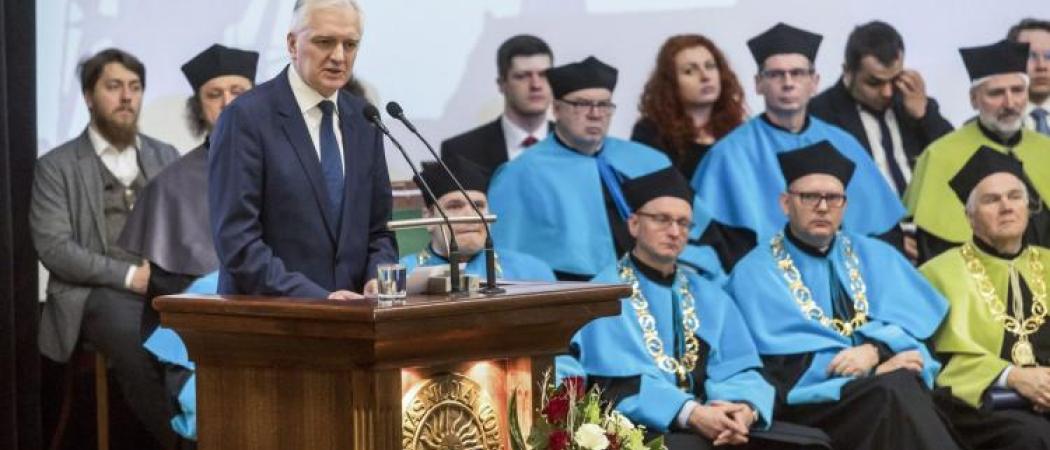A long-debated research and education reform aims to pave the way for universities to become international R&D players

Poland's minister for science and higher education Jarosław Gowin speaking at the Nicolaus Copernicus University in Toruń. Photo: PAP/Tytus Żmijewski
A new law in Poland gives more autonomy to universities in setting research priorities and makes research financing simpler, with the aim of enabling them to become more successful in EU R&D funding programmes and increase their standing on the international stage. Now, researchers are waiting to see if it will produce the hoped for outcomes.
It is up to universities, “to take this opportunity to reflect on how they are organised or to continue business as usual,” said Marcin Pałys, rector of the University of Warsaw.
Pałys said the law, which came into effect on October 1, gives more autonomy to universities to follow their own research agendas. “Generally, I think it gives the opportunity for universities to set their own strategies and not be required to fit in one organisational scheme,” he told Science|Business.
The law, called the Constitution for Science, stipulates that separate streams of funding for teaching and for research should be combined into a single fund and internally distributed by universities.
This is a different approach from new legislation Hungary and Romania, two countries that have decided to keep higher education and research funding streams separate in their response to EU’s push to boost innovation in member states.
The Constitution for Science also allows for the creation of federations of universities. The University of Warsaw is already planning to establish such a federation with the Medical University of Warsaw, a move that could boost interdisciplinary research. “It will have a positive impact, both for research and education,” Pałys says.
However, some researchers in Poland have grown tired of perpetual reforms and say that financing will not necessarily be simpler.
Michal Grabowski, head of the Biogeography & Invertebrate Ecology lab at the University of Lodz told Science|Business the one thing he doesn’t like about the reforms is that they happen so often. Frequent change does not provide stable conditions for scientific work and it is more difficult to set long term strategies. “You never know what to expect,” Grabowski said.
New evaluation criteria
The law also changes the way university performance is assessed. Until recently, universities were evaluated and funded through faculties, but now, in bid to boost interdisciplinary research, the money will follow individual researchers. A scientist studying chemical biology in a chemistry department will be funded with money allocated by the university to biology research, as opposed to being funded directly from her or his department.
In theory, the funding will be following individual researchers and universities will be assessed based on aggregate measurements of performance for each scientist. However, the government has yet to produce a document that explains how it will work. “I don’t know how it will be implemented,” said Grabowski.
If implemented properly, the change could make universities more competitive. Until now, the faculty was as good as its best scientist, but the new law requires all researchers to present papers and achievements for evaluation. “It’s more fair now. “The unit will be as good as the worst scientist,” Grabowski said.
Salaries ‘rat race’
In addition to changing evaluation criteria, the law amends the way researchers are paid and how their salaries are calculated. Before the current reform, the government allowed universities to calculate salaries based on their own journal publication scores. The mechanism worked, with some researchers at the University of Lodz, for example, producing three times more papers listed in Journal Citation Reports, within two years, after the mechanism was introduced.
Grabowski said that tying salaries to publication scores is a good thing, but it has become “a rat race.” Some researchers began to care more about scoring points with the university, instead of focusing on the quality of their research.
The new law aims to end this, but the new points system it puts in place is “more complex” than the previous one, Grabowski said. “I don’t believe it will end this rat race.”
Getting more from the EU R&D pot
In common with neighbours in eastern Europe, Poland is not among the top recipients of EU research funding. In part, this is because universities do not have the administrative support so much needed by researchers when applying for Horizon 2020 grants.
While the new law does not contain specific measures to overcome the lack of administrative support, universities are required to change their internal structures. Grabowski believes this could encourage universities to set up better EU grant support offices. “Now is the time to do the reform of your structure,” he says.
The law has generated strong opinions in Poland, including widespread student protests over the summer. But Grabowski doesn’t see the “catastrophe” image painted by critics. “It is just a chance to improve academia.”
Editor's note: This story was corrected 23 November to better explain the effect of previous reforms on researchers’ salaries.





 A unique international forum for public research organisations and companies to connect their external engagement with strategic interests around their R&D system.
A unique international forum for public research organisations and companies to connect their external engagement with strategic interests around their R&D system.